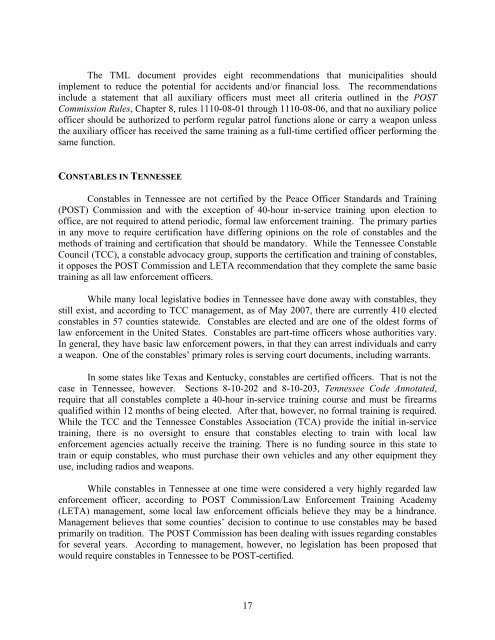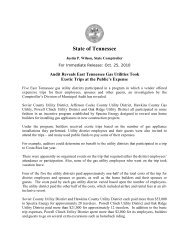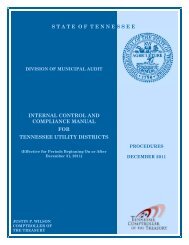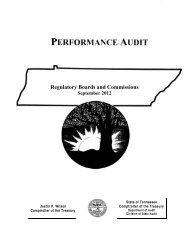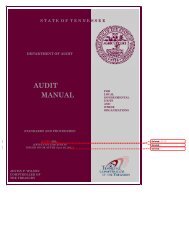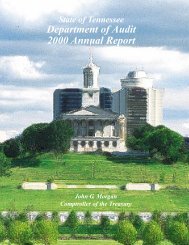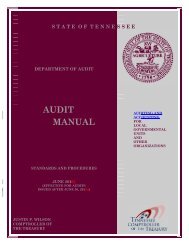Peace Officer Standards and Training Commission and Law ...
Peace Officer Standards and Training Commission and Law ...
Peace Officer Standards and Training Commission and Law ...
- No tags were found...
You also want an ePaper? Increase the reach of your titles
YUMPU automatically turns print PDFs into web optimized ePapers that Google loves.
The TML document provides eight recommendations that municipalities shouldimplement to reduce the potential for accidents <strong>and</strong>/or financial loss. The recommendationsinclude a statement that all auxiliary officers must meet all criteria outlined in the POST<strong>Commission</strong> Rules, Chapter 8, rules 1110-08-01 through 1110-08-06, <strong>and</strong> that no auxiliary policeofficer should be authorized to perform regular patrol functions alone or carry a weapon unlessthe auxiliary officer has received the same training as a full-time certified officer performing thesame function.CONSTABLES IN TENNESSEEConstables in Tennessee are not certified by the <strong>Peace</strong> <strong>Officer</strong> <strong>St<strong>and</strong>ards</strong> <strong>and</strong> <strong>Training</strong>(POST) <strong>Commission</strong> <strong>and</strong> with the exception of 40-hour in-service training upon election tooffice, are not required to attend periodic, formal law enforcement training. The primary partiesin any move to require certification have differing opinions on the role of constables <strong>and</strong> themethods of training <strong>and</strong> certification that should be m<strong>and</strong>atory. While the Tennessee ConstableCouncil (TCC), a constable advocacy group, supports the certification <strong>and</strong> training of constables,it opposes the POST <strong>Commission</strong> <strong>and</strong> LETA recommendation that they complete the same basictraining as all law enforcement officers.While many local legislative bodies in Tennessee have done away with constables, theystill exist, <strong>and</strong> according to TCC management, as of May 2007, there are currently 410 electedconstables in 57 counties statewide. Constables are elected <strong>and</strong> are one of the oldest forms oflaw enforcement in the United States. Constables are part-time officers whose authorities vary.In general, they have basic law enforcement powers, in that they can arrest individuals <strong>and</strong> carrya weapon. One of the constables’ primary roles is serving court documents, including warrants.In some states like Texas <strong>and</strong> Kentucky, constables are certified officers. That is not thecase in Tennessee, however. Sections 8-10-202 <strong>and</strong> 8-10-203, Tennessee Code Annotated,require that all constables complete a 40-hour in-service training course <strong>and</strong> must be firearmsqualified within 12 months of being elected. After that, however, no formal training is required.While the TCC <strong>and</strong> the Tennessee Constables Association (TCA) provide the initial in-servicetraining, there is no oversight to ensure that constables electing to train with local lawenforcement agencies actually receive the training. There is no funding source in this state totrain or equip constables, who must purchase their own vehicles <strong>and</strong> any other equipment theyuse, including radios <strong>and</strong> weapons.While constables in Tennessee at one time were considered a very highly regarded lawenforcement officer, according to POST <strong>Commission</strong>/<strong>Law</strong> Enforcement <strong>Training</strong> Academy(LETA) management, some local law enforcement officials believe they may be a hindrance.Management believes that some counties’ decision to continue to use constables may be basedprimarily on tradition. The POST <strong>Commission</strong> has been dealing with issues regarding constablesfor several years. According to management, however, no legislation has been proposed thatwould require constables in Tennessee to be POST-certified.17


